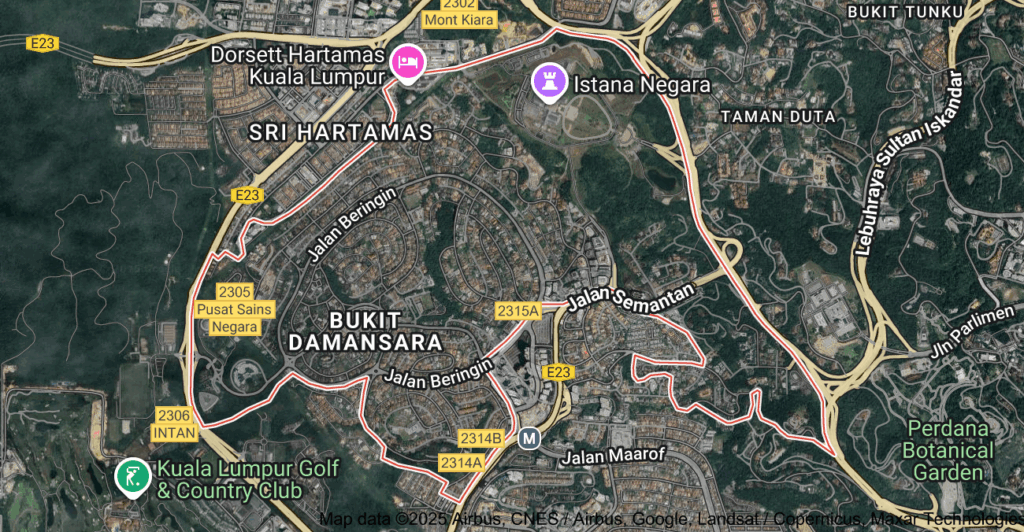
Image courtesy of Google
by Dr Rahim Said
Welcome to Bukit Damansara, Malaysia’s very own Beverly Hills — where the roads are leafy, the cars are mostly German, and the lawns are trimmed by people who can’t afford to live within 10 kilometres.
For decades, this postcode has been shorthand for power and privilege. But this month, it also became the stage for Malaysia’s most ironic protest.
Led by familiar names — an ex-minister-turned-podcaster, a banker related to a jailed politician, a noted female lawyer and a former local jazz queen — residents gathered near Wisma Damansara, clutching placards and chanting “Say No to Skyscrapers.” Their noble cause? To stop the redevelopment of the old, weary building into two 60-storey towers.
Ah, finally — the elites have found their voice. But not to demand affordable housing or fair wages. No, they’re protesting the tragedy of too much development in their backyard.
One of them solemnly declared that Bukit Damansara had been “willing to share” for 30 years — but there must be limits. Indeed. Especially when sharing means losing the serenity of your RM10 million view.
The irony didn’t escape the public. The same people who barely noticed when Damansara City Mall and its towering twin blocks rose just up the hill — clogging roads and shadowing nearby homes — are now up in arms over Wisma Damansara’s facelift. Where was the outrage then? Perhaps silence comes easier when the developer’s cocktails are served chilled and the new mall’s parking is free for “residents.”
For those outside the Damansara bubble, the protest felt like privilege pretending to be civic duty. The same voices that stayed quiet when Kampung Sungai Baru families were evicted now cry foul over imagined congestion.
When Cheras, Jinjang, and Puchong drown under relentless high-rise sprawl, the elites stay politely indifferent. But threaten to touch their skyline — and suddenly, democracy awakens.
I knew Wisma Damansara in its humbler days. In 1974, I stepped into its corridors to meet MIDA officials about student internships, and later met Leo Moggie (now Tan Sri) when he was Minister. It wasn’t glamorous, but it was dignified — a workplace for public servants and dreamers, not millionaires.
My own home nearby was an SPPK house on Jalan Setiakasih, built for civil servants. Modest, leaky, but full of community.
Today, those same houses are snapped up by business elites eager to buy into the prestige of the postcode. The mosque, once a meeting point of neighbours, now reflects the same stratification — same prayers, different classes of worshippers.
This protest has done something useful, though. It stripped away the illusion that Malaysia’s social divisions are still about race. The real divide is economic. The T20 fortress has become an island surrounded by an ocean of frustration — the M40s slowly sinking, and the B40s gasping for air.
As Professor Awang Azman of Universiti Malaya points out, the backlash against Bukit Damansara reflects the country’s shift from racial resentment to class resentment. And as Dina Zaman notes, young Malaysians now see a system that rewards connections, not competence. The rich build walls, and call it “preserving character.”
The Bukit Damansara rally wasn’t about traffic. It was about territory — the invisible boundary between “us” and “them.” Between those who can afford serenity and those who are condemned to chaos.
So, while the residents of Bukit Damansara march to save their skyline, others march just to make ends meet. One fights shadows on their swimming pools; the other fights for a roof over their heads.
“The rich protest for scenery; the poor protest for survival.”
Editor’s Note:
The Bukit Damansara protest underscores a growing theme in Malaysia’s urban story — the widening chasm between privilege and precarity. As the nation debates housing, transport, and development, the conversation is shifting from who we are to how we live. The challenge for policymakers — and for citizens — is to ensure that progress does not remain the preserve of the few. When exclusivity masquerades as civic concern, it deepens the divide. Fairness, not fences, should define the Malaysian dream.
(The views expressed here are entirely those of the author)
WE